Update 45
Mexico's Crusade Against Hunger
The idea that global food businesses can be useful partners in hunger campaigns took a bizarre turn in April 2013 when the Mexican government launched a Crusade Against Hunger.
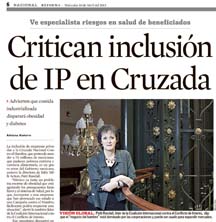
Baby Milk Action's Policy Director Patti Rundall was invited by El Poder del Consumidor (Consumer Power) to a series of meetings with Senators, Parliamentarians and the media to raise awareness about Conflicts of Interest.
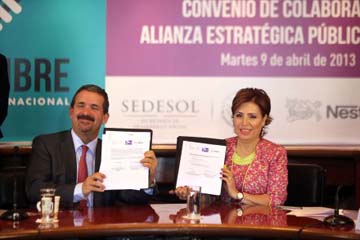
We were about to congratulate the Secretary for Development, Rosario Robles, for including breastfeeding protection in the Crusade when two partnerships were announced, before any academics or NGOs had been consulted. Among other worrying ideas, Pepsi would provide fortified formulas for pregnant and nursing mothers and Nestlé (above) would create a programme called Mi Dulce Negocio Nestle (My Sweet Business). This would involve teaching 15,000 women how to sell desserts and give nutrition advice in Mexico’s poorest regions.
While Nestle’s plan is the last thing the world’s largest junk food company should be doing - Pepsi's scheme could be even more dangerous. We know formulas for mothers undermine women's confidence in breastfeeding and have been used by other companies such as Fonterra to pave the way for the introduction of formulas for babies. (See ICDC Briefing on Fonterra page 25.)
About half of Mexico’s 115 million population is classified as poor, with about 12 million of those living in extreme poverty. But Mexican people also have one of the world’s highest rates of obesity and diabetes – diseases that are largely driven by the marketing of ultra-processed foods. Instead of helping small farmers and producers, the Crusade will empower large corporations and facilitate the penetration of their unhealthy foods deeper into the Mexican market, under the perfect philanthropic guise of conquering malnutrition. The scheme also threatens Mexico’s unique food culture and ecosystem, which has been declared by UNESCO as an Intangible Cultural Heritage of Humanity.
Alvaro Urreta Fernandez, President of the Union of Producers and small merchants, Mexico City, said: "The uncontrolled growth of these multinational corporations has a negative economic and social impact, harming small producers of fruits and vegetables, encouraging an increase in the consumption of junk foods and dramatically decreasing the consumption of fresh fruits and vegetables."
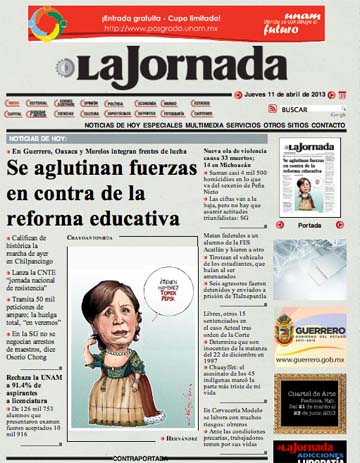
Some of the 50+media reports on the criticism of the Nestllé/Pepsi deals. From top: El Reforma, Marcelo Melchior, President of Nestlé Mexico, and Rosario Robles, Secretary of Social Development signing the deal; Cartoon of Robles in La Jornada - showing her dressed as Marie Antoinette saying "Are you Hungry? Have a Pepsi."
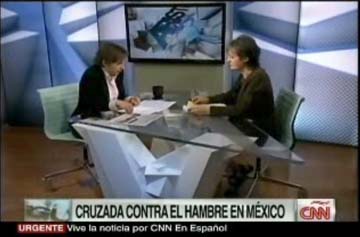
Patti Rundall being interviewed by Carmen Aristagui on CNN. April 2013.
International and national NGOs join forces
The media coverage helped raise awareness among NGOs. A petition, organised by LLL Mexico, quickly attracted 3,000 signatures. LLL also joined 10 other leading international NGOs such as the International Obesity Task Force, ILCA, IBFAN and Consumers International in an open letter to President Nieto, placed in 2 major newspapers. Meanwhile Mexican NGOs are organising Policy Forums and media events, keeping the issue alive. 27 NGOs met Javier Guerrero, the National Vice Coordinator of the Crusade in Chiapas, expressing unanimous opposition to the corporate involvement. Later the National Institute of Nutrition met Secretary Robles and asked her to support three proposals: access to potable water; a healthy market system with local products that are not processed and legislation to protect breastfeeding, insisting that the proposals are carried out independently of the companies.
Secretary Robles welcomed the ideas and as we go to press has also agreed to discuss the international concerns with Patti Rundall. Let’s see....
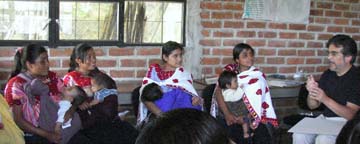
Dr Marcos Arana, of the National Institute of Nutrition and IBFAN Latin America’s Policy Council, with young mothers in Chiapas, where the infant mortality rate is, according to some estimates, as high as 27 per 1000.
"Nestlé's plan to train 15,000 women to sell desserts and do education could represent one of the biggest violations of the International Code and Resolutions. Direct or indirect contact with mothers is forbidden by the Code for very good reasons. In my region of Chiapas, every day I see how bad infant feeding results in malnutrition and infant deaths."
Mexico’s breastfeeding rates are appalling. From 2006-2012, exclusive breastfeeding under six months decreased from 22.3-14.4%, with a 50% drop in rural areas [ENSANUT 2012]. Small wonder when many key aspects of the International Code are voluntary, health claims abound, in some private hospitals less than 4% of births are normal, babies are routinely separated from their mothers and free/low-cost supplies of formula continue on a rotation system. There is just one Baby Friendly Hospital in Mexico City!
Brazil’s Zero Hunger strategy
The inspiration for the Mexican Crusade was said to be Brazil’s Zero Hunger strategy. However several critical points were ignored: namely that it was a fully thought-out development agriculture programme that followed extensive consultation with civil society. Public policies were in place to protect and strengthen breastfeeding and food systems and only civil society and government representatives - not conflicted industries - took part in its policy design and implementation. As a result, the national school feeding program is 100% publicly funded, with at least 30% of the food purchased from local producers at least 70% unprocessed products. Because of industry lobbying some conflicted industries are involved, but so far to a limited extent.
Nestlé’s Creative Storytelling Venture at shareholder AGM
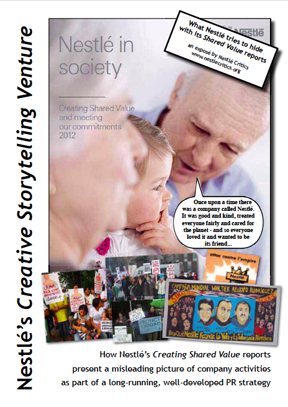 Nestlé’s 146th shareholder meeting was held in Lausanne, Switzerland, on 11 April 2013 and Chairman Peter Brabeck-Letmathé launched his latest CSV report.
Nestlé’s 146th shareholder meeting was held in Lausanne, Switzerland, on 11 April 2013 and Chairman Peter Brabeck-Letmathé launched his latest CSV report.
This refers to Nestlé Creating Shared Value Initiative, though critics suggest Creative Storytelling Venture is more appropriate and released an analysis with this title. For example, Nestlé claims it had to act on few baby milk marketing violations, neglecting to say it rejected 97% of those reported by IBFAN.
The Nestlé Critics call on those wishing to improve Nestlé behaviour to look at what the company actually does, not just what it says it does. As the analysis explains, Nestlé Public Relations (PR) strategy for diverting criticism was developed in the 1970s by PR guru Raphael Pagan and continues to be followed to this day, with modifications involving sometimes underhand practices, such as spying on campaigners (a Swiss court ordered Nestlé to pay damages and costs to Attac Switzerland in January 2013 after it infiltrated the group).
The analysis can be downloaded free of charge - click here.
Marketing offenders report exposes new trends
 A new monitoring report was launched by BPNI at the World Breasfeeding Conference.
A new monitoring report was launched by BPNI at the World Breasfeeding Conference.
It shows that companies continue to advertise baby formulas when they think they can get away with it.
For example, in Canada, Mead Johnson advertises Enfamil with the headlines (below, left): "You want her to be healthy... Patterned after breast milk for your baby’s normal, healthy development."
In the Ukraine, Danone advertises follow-on milk for use from 6 months with the claim "Immunity is strengthened" (below, right).
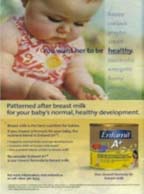
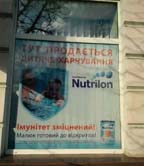
Most companies are investing heavily in promoting so-called growing up milks, unnecessary products that are claimed to benefit health. Health claims are increasingly being used on baby foods too. Ghana has a strong baby milk marketing law, so there Nestlé claims its Cerelac porridge "Helps Strengthen Babies’ Natural Defenses" (below).

World Breastfeeding Conference 2012
India hosts the world - and leads by example
Baby Milk Action's Mike Brady and Patti Rundall were guest speakers at the World Breastfeeding Conference in New Delhi, (6 - 9 Dec. 2012)
The event was organised by IBFAN’s Breastfeeding Protection Network of India (BPNI) in partnership with the Indian Ministry of Women & Child Development and Ministry of Health & Family Welfare. Its slogan was "Babies need mom-made not man-made" and called on people to "Join the Fight" against promotion of formula over breastmilk.
The Conference was chaired by Dr Arun Gupta of BPNI and Coordinator of IBFAN Asia, and officially opened by Anwar Fazal, former President of Consumers International and founder of the World Alliance for Breastfeeding Action, IBFAN stalwart Helen Armstrong, IBFAN Coordinating Council Chair, Joyce Chanetsa, UNICEF representative Nicholas Alipui and representatives of the Indian Government and US Embassy.
Dr Gupta lights the Conference flame with Smt Krishna Tirath, (Minister for Women and Child Development), Mr Louis-Georges Arsenault (UNICEF Country Chief for India), Arwan Fazal, Helen Armstrong and Mr Salman Khurshid (Minister of External Affairs). Smt Krishna Tirath told Conference the Government was shortly introducing a trial system of payments for new mothers to enable even those in the informal sector to have time off work (click for large version - copyrighted).
Among the many memorable moments: The Directorate of Health Services, Haryana, India explaining how they seized Nestlé products that broke labelling laws - and were themselves labelled as "activists" by the company. Elisabet Helsing, who helped create Norway's supportive breastfeeding culture through her writing and founding of the mother-to-mother support group Ammehjelpen in 1968. Elisabet reminded the conference that the battle was not over and that even in breastfeeding cultures mothers need support, policy makers need educating and formula companies need to be kept at bay. Learning from Dr Homayoun Ludin’s presentation that Afghanistan has something to teach the world on protecting mothers and babies, as it removed idealising baby food billboards (below) across the country after introducing marketing regulations and put up others promoting breastfeeding.

Above: Nestlé Cerelac billboard before being removed in Afghanistan.
Below: Session on Holding Companies to Account, Baby Milk Action and Philippines campaigners.
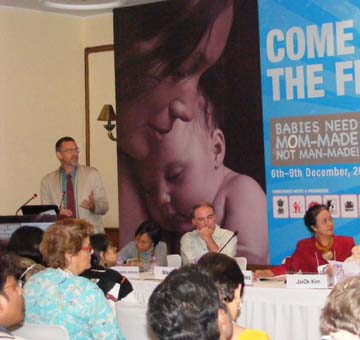
Mike Brady with campaigners from the Philippines, Velvet Escarlo-Roxas, Alessandro Iellamo, and Ines Fernandez.
Editorial: Plotting the path to protection for babies and families
IBFAN’s World Breastfeeding Conference took place in New Delhi in December 2012, organised by our partners the Breastfeeding Protection Network of India.
It was an inspiring event, done with no commercial sponsorship, yet bringing together over 700 people from more than 80 countries, including many famous names from the breastfeeding and campaigning world. (See page 4).
The latest IBFAN World Breastfeeding Trends report was launched, measuring progress in protecting, promoting and supporting breastfeeding in 54 countries. Also launched was a paper costing how to achieve optimal infant and young child feeding. This would improve infant survival, quality of life, reduce health inequalities, and save resources. Surely a worthwhile investment! (See page 9).
Under existing international agreements, it can be argued that mothers and babies have a right to breastfeed and that governments are duty bound to protect and deliver this right,while others should respect it. (See page 13).
In the last year Kenya, South Africa and Vietnam have introduced new legislation implementing the International Code of Marketing of Breastmilk Substitutes and subsequent, relevant Resolutions of the World Health Assembly.
South Africa’s law follows nine years of struggle against intensive industry pressure and covers products marketed for children up to two years of age. There was a struggle too over Kenya’s law that covers products up to three years of age including the unnecessary formulas for older babies - so-called "growing up milks." These products often share the same branding as formulas for young babies but circumvent the restrictions that apply them. Kenya came under particular pressure from GAIN, (the Global Alliance for Improved Nutrition), as it continued to open up markets for its partner companies (including Danone). GAIN is on the lead group of SUN - Scaling Up Nutrition.
In November We published a discussion paper outlining IBFAN’s concerns about how SUN and GAIN are encouraging governments to partner with business. The idea that food corporations can be useful partners in hunger campaigns was taken to a bizarre extreme in Mexico - with the launch of a Crusade Against Hunger in partnership with Pepsi (providing formulas for children and nursing mothers) and Nestlé teaching 15,000 women how to sell desserts and give nutrition advice! (See page 6).
In the Philippines companies, led by Nestlé, threatened to cancel a US$400 million of investment if its regulations are not weakened. Which brings us back to India where Nestlé products were seized for breaking labelling laws. The Indian formula market fails to grow. Meanwhile in the UK, we won cases against misleading advertising and stopped a Baby Know How roadshow planned by Pfizer Nutriton (since taken over by Nestlé). With the poor UK law and Nestlé now entering the market, we are seeing more aggressive practices.
Who, what, why?
Baby Milk Action
Baby Milk Action is a non-profit organisation which aims to save infant lives and to end the avoidable suffering caused by inappropriate infant feeding. We work as part of the International Baby Food Action Network (IBFAN) to strengthen independent, transparent and effective controls on the marketing of the baby feeding industry. IBFAN has over 200 member organisations in more than 100 countries.
Baby Feeding Law Group
Baby Milk Action is the Secretariat for the Baby Feeding Law Group which is working to bring UK legislation into line with UN Resolutions. BFLG members include consumer and mother-support groups and professional bodies such as the Community Practitioners and Health Visitors’ Association, the Royal College of Midwives, the Royal College of Nursing, the Royal College of Paediatrics and Child Health, and UNICEF's Baby Friendly Initiative.
International Code
We work for controls implementing the International Code of Marketing of Breast-milk Substitutes (The International Code). This Code was adopted in 1981 by the World Health Assembly (WHA), the world’s highest policy setting body. The International Code bans all promotion of breastmilk substitutes and was adopted as a ‘minimum requirement’ to be implemented by member states ‘in its entirety’.
The International Code and the subsequent relevant WHA Resolutions, which have clarified or extended certain provisions of the Code, must be considered together in the interpretation and translation into national measures.
Protecting breastfeeding
There is no food more locally produced or sustainable than breastmilk. A breastfed child is less likely to suffer from gastroenteritis, respiratory and ear infections, diabetes, allergies and other illnesses. In areas with unsafe water a bottle-fed child is up to 25 times more likely to die as a result of diarrhoea. Reversing the decline in breastfeeding could save 1.5 million lives around the world every year. Breastfeeding helps fulfill the UN Millennium Development Goals and has the potential to reduce under-5 mortality by 13%. A further 6% of deaths could be saved through appropriate complementary feeding. Breastfeeding also provides health benefits to the mother, such as reduced risk of some cancers.
Protecting babies fed on formula
Breastmilk substitutes are legitimate products for when a child is not breastfed and does not have access to expressed or donor breastmilk. Baby Milk Action lobbies for regulations which ensure that their composition and labelling is as safe as possible.
Companies should comply with all the International Code requirements to reduce risks - independently of government measures. Parents have a right to accurate, independent information.
Contact details
Baby Milk Action, 34 Trumpington St, Cambridge, CB2 1QY, UK
Tel: (01223) 464420 Fax: (01223) 464417
Baby Milk Action is funded by membership (£18 waged, £7 unwaged, £25 family, and organisation affiliations), donations and merchandise sales.
We have received grants from the A Team, S E Franklin Deceased Charity, Network for Social Change, OXFAM, Save the Children and SCIAF.
Update 45 was written by Mike Brady and Patti Rundall. Update is free to members and affiliates.
Contents
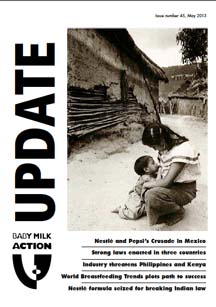 Click here to download as a pdf file.
Click here to download as a pdf file.
Online version
Click on the links in the contents list below.
You will find 'next page' links at the bottom of each page.
The page numbers follow the printed version.
Page 2
Page 3
Editorial: Plotting the path to protection for babies and families
Page 4
World Breastfeeding Conference 2012
Page 5
Marketing offenders report exposes new trends
Nestlé’s Creative Storytelling Venture at shareholder AGM
Page 6 - 7
Mexico's Crusade Against Hunger
Page 8
World Breastfeeding Conference Declaration (extract)
Page 9
Scaling up breastfeeding - what will it cost?
Save the Children launches campaign on breastfeeding
Farewell to two gentle giants: Andy Chetley and Zef Ebrahim
Page 10 - 11
Page 12 - 13
Breastfeeding is a human right. What does that mean?
Page 14 - 15
Struggles for Regulations won: South Africa, Vietnam and Kenya
Page 16
Nestlé and co's US$400 million threat against the Philippines
Page 17
- Latest trends: baby clubs, social media and health workers
- Danone free booklet undermines home-grown organic foods
Page 18
- Holding Wyeth/Pfizer to account: SMA advertising ruled misleading, email marketing condemned and...
- ...the SMA Baby Know How roadshow stopped
- No promotion - cheaper formula
Page 19
Irish Midwife of the Year refuses to be branded with SMA
Page 20 - 21
Eye on Nestle
- Nestlé loses spying case and is ordered to pay damages to victims
- Nestlé completes takeover of Pfizer Nutrition/Wyeth
- Nestlé centre monitors digital communications
- Nestlé weakens its formula marketing policy - change prompted by FTSE4Good?
- WHO speaks out against PAHO - Nestlé link
Page 22
Nestlé boycott
- Taming the Nestlé monster at the last Croydon demo
- Nestle tries to undermine International Nestle-Free Week with KitKat pledge
- Rachel’s Dairy added to Nestlé boycott list
- US Girl Scouts shamed by association with Nestle
Page 23
Page 24
IBFAN Concerns about Public Private Partnerships
Page 25
Page 26
Policy news
- No claims at Codex - FAO and AIMI youtube films
- European Union
- WHO Reform, Non-communicable Diseases, Conflicts of Interest and WHO’s interactions with "Non State Actors"
Page 27
Essential reading - free downloads
Page 28
Featured items in the Virtual Shop
Update 45
 Update 45 - May 2013
Update 45 - May 2013
Top stories
• Nestlé and Pepsi’s Crusade in Mexico
• Strong laws enacted in three countries
• Industry threatens Philippines and Kenya
• World Breastfeeding Trends plots path to success
• Nestlé formula seized for breaking Indian law
Click here to download as a pdf file.
Click here for the online version with links to supporting information.
- « first
- ‹ previous
- 1
- 2
- 3







